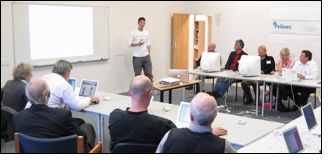 I presented a seminar about Open Source software tools today at one of Core's Breakfast Seminars. I was warmed by the enthusiasm shown by the attendees, some of whom I recognised from last years' NAVCON conference where I presented several workshops. The participants included school principals, teachers, ICT technicians, software developers and some folk from local commerce.
I presented a seminar about Open Source software tools today at one of Core's Breakfast Seminars. I was warmed by the enthusiasm shown by the attendees, some of whom I recognised from last years' NAVCON conference where I presented several workshops. The participants included school principals, teachers, ICT technicians, software developers and some folk from local commerce.
We attempted a SubEthaEdit session as a means to collect information about participants, their professional interests and what they were hoping to gain from the seminar. A few issues arose with that, which is a lesson to never assume everything will work just fine even though I've had very successful experiences many times previous.
I progressed by talking about what open source tools are out there - you can see those I mentioned in my presentation, I used webnote as the tool of choice.... it means I can present, finish and leave my presentation available for the participants to follow up later. It all works.
An interesting discussion was held about the proprietary vs. inhouse (custom developed tools) vs. open source arguments - some valid points raised here. One question centred around what support there is for users of Open source software when the going gets tough and the technology fails at a critical moment. Typically there is no call-out or telephone support, so what happens then? It was interesting to note that some participants had experienced fast responses from open source communities with solutions and fixes, some not necessarily from the development team but from the user-base.
A good discussion was held about the challenge of appropriating a range of tools and how these could be tied together is becoming an ever increasing issue we need to solve. Single sign-on, LDAP are becoming more and more essential as time passes by. It was clear the same pain was felt by many participants in the room. Where is the solution? Why hasn't a tool which empowers users to do this without needing a computer science degree been developed yet?
Hopefully participants left with ideas for what tools they have at their disposal and a greater understanding of integrating open source solutions in their workplaces.
Thanks go to Vince, Krissie, Stephen Powell, and Jedd for their assistance with making all this happen.